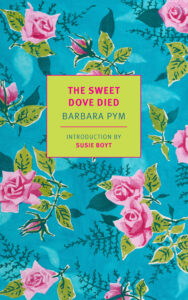In December 1967, eleven years before The Sweet Dove Died was published, Barbara Pym wrote to Philip Larkin, enclosing her first draft. (The two maintained a correspondence for fourteen years, before eventually meeting in 1975.)
Article continues after advertisement
The new book I mentioned really is new…The friend who has read it thinks it almost a sinister and unpleasant book, which may be all to the good. I didn’t try to make it so, but tended to leave out boring cosiness and concentrate on the darker side.
Larkin’s response was measured but encouraging: “I think there’s more potential feeling in this book than any you have written before.”
Pym was in need of encouragement. At the time of the letter she had not published a book since 1961, when No Fond Return of Love, her sixth novel, appeared. It features Dulcie and Viola, academic indexers both, one brokenhearted, one merely heartsore, each of whom becomes obsessed with a married literary critic. There was a sense among publishers that the world Pym presented, what she herself called “BP type novels” had become too cozy and old-fashioned. It’s true that on page 3 of No Fond Return the word “rather” occurs as an adverb of degree four times in eleven lines. One night Dulcie falls asleep thinking “Life’s problems are often eased by hot milky drinks.” Despite Larkin’s admiration The Sweet Dove Died was rejected by some twenty publishers in its various forms. To Pym it seemed her career was at an end.
The Sweet Dove Died is a novel that sets clashing unexpected currents in motion to stimulate and unnerve.
All this changed in 1977 when Larkin and Lord David Cecil both cited Pym when The Times Literary Supplement asked leading literary figures to name Britain’s most underrated novelists. Larkin praised her “unique eye and ear for the small poignancies and comedies of everyday life”; Cecil singled out her novels as “the finest examples of high comedy to have appeared in England during the past seventy-five years.” Publishers new and old sat up. Quartet in Autumn was published that year and short-listed for the Booker Prize. It was followed by The Sweet Dove Died, which Pym took out of the drawer. Suddenly she was feted in England. She appeared on Desert Island Discs, where she chose The Golden Bowl by Henry James as her book and a supply of German white wine for her luxury. The BBC made a documentary about her. With characteristic charm she signed off a letter to Larkin that year “from the most over-estimated novelist of 1977.”
It is possible, however, that The Sweet Dove Died languished for so long not because it was too quaint but because it was too uncomfortable. It is a brittle novel, often brutal. The text is a matrix of longing and loathing, the two states often indistinguishable. Recurrent moments of casual spite are scalding. Small miracles of kindness and kinship are thin on the ground. Even that great moral and emotional English balm—tea—is found wanting, demoralizing by association, because it’s what the weak crave. Or it proves too strong, in one disastrous instance resembling meat extract in the cup. There is a brief cameo for a curate who pops up on a train and is mildly flirtatious, but then Leonora, the novel’s heroine, gets off at Moreton-in-Marsh, while he stays on until Malvern, and that is that.
The Sweet Dove Died is a novel that sets clashing unexpected currents in motion to stimulate and unnerve. Viewed from one angle it is a novel about first love afflicting a woman approaching fifty. Leonora Eyre has dealt herself out of the world of strong feeling. Love is both beyond and beneath her until she meets James, an attractive antiques dealer in his twenties who lost his mother young and is himself lost.
James has one foot in the Victoriana of his uncle’s Chelsea antique shop and another in the youth-driven modernity of 1960s London. He is fresh and unmoored, with a curious almost worldly innocence that proves irresistible. His widowed uncle Humphrey is a more suitable suitor for Leonora—he is taken with her instantly—but he’s no James. The Sweet Dove Died can also be read as a curious form of bildungsroman, not of a child progressing through adolescence into adulthood, but of a similar journey, undertaken by misery, which advances into fully realized form. When Leonora slumps against tins of asparagus tips and white peaches in her larder, the moment of collapse is close to unbearable.
The Sweet Dove Died is considered Pym’s most Jamesian work and there are inflections of the Master in the themes of falling out of love, renunciation, and collecting—the pursuit of beauty falling short. Edith Wharton also hovers in the narrowing of female options as the years pass by.
Leonora is unique among Pym heroines. Unlike almost all of that cohort she would have cared little for the novels of Pym. (In Jane and Prudence when a character says, “We could open a tin,” you half expect the next line to be: “We could read a Barbara Pym.”) Though Leonora situates Browning and Matthew Arnold artistically on her bedside table, reading In Memoriam on the train, the writing she most relishes is auction catalogues: “narrow crossbandings of tulipwood, palm tree motifs and eagles cresting.”
Leonora possesses an unwieldy, arch brand of femininity. A three-course meal is the work of a moment, but she’s insulted when her neighbor thinks she might own a bucket to lend. She nurses a disdain for female friendships, a distaste for sadness, a horror of self-service cafeterias, a dislike of “being kissed by women, or indeed by anyone very much,” a loathing for sheepskin, an enmity for people who look to animals to cure loneliness, and a hatred of indifferent clothing. Her wardrobe is immaculate. She likes to drink crème de menthe in green chiffon. Lilac tweed is a mainstay. Black silk in the evening, she observes, wins admiration.
Leonora measures out her days in courtesies and slights, the former dominating the beginning of the book, the latter rapidly gaining ground. She often displays that pernicious English trait of bullying disguised as good manners. Scorn is a salve for her—an enjoyable expression of her fastidious nature and a coping strategy. She puts down others to keep herself buoyant. She likes to insult unfamiliar surroundings to underwrite her own stagy elegance. Good lighting is all. Staunch pride and a tendency to humiliation are closely aligned in Leonora. She watches over her beauty as one might care for an invalid child. She has constructed a world for herself that is out of the real world’s league.
When Pym is unabashedly cozy it is often filtered through intelligence and wit.
The Sweet Dove Died is more caustic than anything else Pym wrote. Yet it would be crass to dismiss the earlier novels for accretions of “boring cosiness.” There are sharp things everywhere, some unforgettable, as when a failed, unpromising love affair in No Fond Return of Love is pitched as indecently sad, “the death of such a very little thing, like a child’s coffin.”
When Pym is unabashedly cozy it is often filtered through intelligence and wit. She had a natural talent for cheer, not as deflection or crutch but as a branch of her wry, high-spirited creativity. Glancing at her letters and diaries there are delightful moments throughout. Her friend and literary executor Hazel Holt quotes Pym musing: “Wouldn’t it be marvellous if you could give all your love letters to the Bodleian library and then go and read them 30 years later?” Her diary entry for Remembrance Sunday, 1977, includes “Success: cooking in sunflower oil a dry, unripe avocado.” In a letter to Larkin, responding to his decision to embark on an economy drive, Pym remarks, “But Earl Grey tea has gone down from 46 to 44p a quarter!”
Perhaps it was her warm representation of the Anglican church, specifically the numerous lugubrious, comical, or heroic clergymen (twenty at my last count) in an age of religious decline, that stalled Pym’s career. These were staples of her upbringing and her reading, the punctuation of her days as a practicing Christian. Had she grown up in Hollywood, with MGM cowboys knocking back bourbon, or in a mining community or fishing village with its attendant strains and tragedies, might she have been spared these painful gaps in publication, which were so wide as to have been unsuited to the human lifespan? (It took fifteen years for her first novel, Some Tame Gazelle, completed when she was twenty-two, to find a publisher.)
Hazel Holt wrote: “We spoke endlessly of her rejection. Her confidence was shaken and she only partially accepted the reassurances of her friends that it was the times that were out of joint and not her talents.”
The Sweet Dove Died is a scrupulous novel. Serious and searching, it examines a society in a state of high flux, pins it down and opens it out. It pitches new freedoms against dying rules and routines, with a keen eye for the debris, as its worlds of beauty and cruelty collide.
__________________________________

From The Sweet Dove Died by Barbara Pym. Copyright © 2025. Introduction © 2025 by Susie Boyt. Available from New York Review Books.
